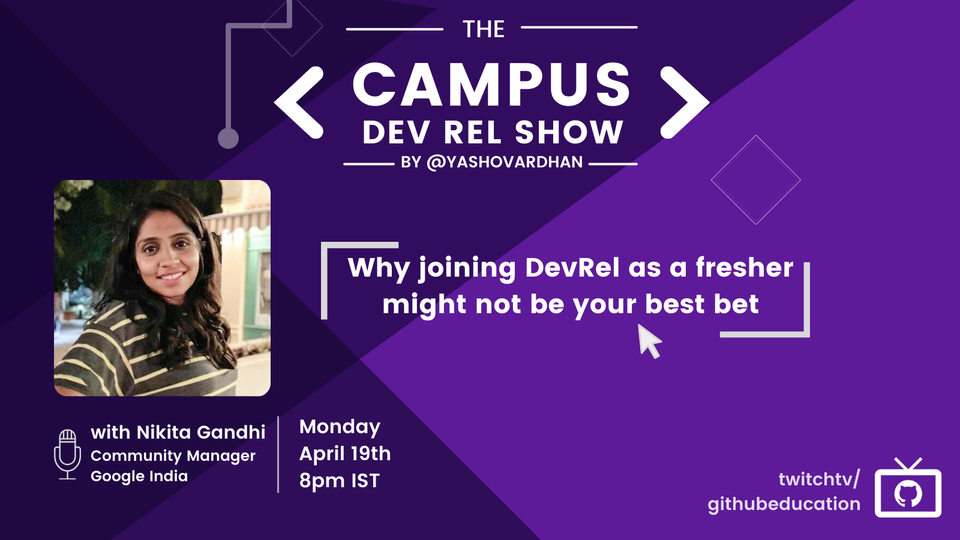Why joining DevRel as a fresher might not be your best bet? - Nitika Gandhi


Hello! We are back with DevRel.Page’s The Campus DevRel Show — Episode 4. For the ones who don’t know, The Campus DevRel Show is all about making student community leaders understand the field of developer relations with the help of people who are actually on the job. Community Managers, Program Managers, Developer Advocates, Evangelists and other DevRel professionals, sharing their stories on how they started their journeys, especially focusing on their learnings from it.
Make sure you check out the previous episode of The Campus DevRel Show if you haven’t already. If this is the first time you’ve landed on our blogs, make sure you check out DevRel.Page for more info!
So to move forward, lets’ welcome today’s guest speaker, Nitika Gandhi, Developer Community Manager at Google, managing Google Developer Groups (GDG) program in India.
Nikita’s college days
Nikita’s passion for coding started from her transition from not being serious about engineering to being part of communities where she realised the importance of the DevRel space and to pick an engineering role to get started. Her journey started in her second year of university where she joined Google Student Clubs (Now Developer Student Club). Within a few months, she became the organiser for PyLadies Pune. Eventually, she started organising a lot of workshops along with RedHat and seeing her contributions, the Python Software Foundation sponsored her a trip to attend PyCon Seol. Seeing the value of being an active community organiser, she started exploring more into the technical communities space, starting her journey into DevRel.
Although this doesn’t mean she dived into DevRel just after her college days, she’ll later come to explain more on how she navigated her career to understanding the essence of product management, which she feels is one of the major aspects one needs to learn before exploring the community space as a career option.
Nikita’s journey into Developer Relations at Google
Nikita mentioned that she has had extensive experience in both startups and MNC’s. She had been very active in the community spaces where she shared and talked about her work with a lot of folks. She eventually met a connection who happened to be CEO of the company where she landed her first job! Her experience with building projects and research internships with IITB, helped her understand how a product works, along with her community work, where she had extensively managed a lot of initiatives.
Her rollercoaster ride of startups started when she joined her first company, which unluckily had to shut down just within 6 months. She leveraged this situation and identified the key points where the company went wrong. Nikita wanted to see for herself if she could work on those key points and decided to start her own company. Although her first startup failed, she got a ton of learnings from it. She went on creating another startup of her own which provided network security audits to various companies and made a mobile application focused on learning the basics of hacking, and learning by coding all on mobile devices.
One thing led to another and eventually, she joined Google AI, working with their education team to build content for university students in India. She later got into building strategies, as per her previous experience and understanding of products and developer communities. Her side ventures for communities never stopped, which also made her closely observe the existing developer relations team at Google and take side projects from them. She then was invited to join the developer relations team at Google!
In Nikita’s experience, what is the difference between being a community organiser and managing a program holding- hundreds of community organisers?
For Nikita, there’s almost no difference. The way she manages organisers is by being one among them. The basic thing is to understand that being a community organiser is not a full-time job and people need to manage their time for such contributions. But, at the same time, she does agree to the fact that practically there is a difference between what folks see from outside and what the internal team’s perspective is. When viewed from outside, DevRel to most folks revolves just around managing events, setting a budget and getting to travel to various places. Those are definitely some perks, however, behind the scenes, there’s a lot happening that people aren’t aware of. Nitika also stresses the fact that most open-source organisations work on a voluntary basis. Hence, it is extremely important to understand that individuals have their own lives and work. Expecting volunteers to dedicate most of their time isn’t the right way. It is important to step into their shoes and be an organiser first to be able to manage more than 400+ organisers — something that Nikita pulls off really well!
Why should freshers NOT dive into developer relations directly?
When students dive into the world of organising events — the whole process involves a lot of meetups, building new connections, getting that “Oh! I know him!” tag in the student community. Although this seems very attractive to the majority at first, the thing they don’t realise is that it involves a lot of thought processes to sit and build those strategies from the ground up, especially executing them later.
Nitika also puts a perspective on how Developer Relations is a lot about People Management which is not something that can be rushed to get skilled in. It takes years of personal experience from each individual’s life and professional experiences to build those people and program management skills. Students should face the current trends in the industry, get some exposure, grab those skills and develop the developer mindset first, before diving into the community space.
Try to understand developers better — you can understand their perspective only when you are a developer yourself and understand the challenges you and your teams have faced.
Empathise! To be a successful developer relations person. One needs to curb their personal biases towards various individuals and spaces. A developer ecosystem is a massive place filled with unique individuals having various backgrounds and learning curves. Developer Relations folks are expected to have an open mind to approach anything new without having a preconceived notion about the community individuals.
This wraps up today’s blog of The Campus DevRel Show. It was a great insight into Nikita’s journey, filled with a lot of takeaways for beginners who are looking forward to getting started with their journey into developer relations.
Huge shoutout to Prathamesh for summarising this episode in his tweet. Feel free to take a look at his summary here!
As we saw in the previous episode with Aravind as well, it is important not to rush into developer relations as a fresher. It is a step by step process within the corporate world where you need to build up the experiences first. Rushing into things might prove to be successful for a few, but later on, they have a hard time catching up. Building a strong foundation is the key. Make sure to check out that episode if you haven’t already! Also, don’t forget to check out DevRel.Page, we have lots of content to get you started with your journey in exploring everything in and around Developer Relations.

